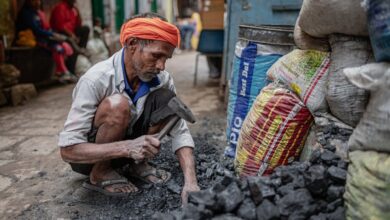The Paradox of Progress: A Half-Full, Half-Empty Glass

There’s a curious paradox at the heart of our collective fight against climate change. On one hand, you see the undeniable momentum: solar panels glinting on rooftops, electric vehicles becoming increasingly common, major corporations pledging net-zero, and global leaders convening to hash out ambitious targets. Public awareness has never been higher, and the urgency feels palpable. We are, undeniably, *trying*. But then you read reports like the one recently released by a coalition of climate groups, and the immediate feeling is a gut punch: our efforts, while real, are simply not fast enough. In some critical areas, we’re even losing ground.
It’s like being in a race where you’re running harder than ever before, but the finish line keeps moving further away, and some competitors are still running in the wrong direction. This isn’t just about good intentions; it’s about the chasm between intention and impact, between the urgent need and the glacial pace of systemic change. Let’s unpack this complex reality and understand why, despite our best efforts, we’re still falling short.
The Paradox of Progress: A Half-Full, Half-Empty Glass
The report’s findings paint a nuanced, often frustrating picture. It’s not that we’re doing nothing. Far from it. Across various sectors, there’s evidence of genuine effort to decarbonize, innovate, and adapt. Investments in renewable energy technologies have skyrocketed. Many countries have set ambitious emissions reduction targets, some even enshrining them into law. Global dialogue around sustainability and environmental justice has reached unprecedented levels.
Where We’re Seeing Glimmers of Hope
Think about the incredible strides made in renewable energy. The cost of solar and wind power has plummeted, making them competitive, and often cheaper, than fossil fuels in many regions. Battery storage technology is advancing rapidly, addressing intermittency concerns. Electric vehicle sales are breaking records year after year, pushed by both consumer demand and evolving government policies. These are tangible, measurable wins that demonstrate what’s possible when innovation, policy, and market forces align. Public engagement, too, has evolved from niche activism to a mainstream concern, pushing political agendas and corporate accountability.
Even in policy, there are signs of progress. More nations are signing onto international agreements, setting carbon pricing mechanisms, and investing in green infrastructure. The sheer volume of scientific research and data available on climate change has made it harder to deny the reality, shifting the conversation from “if” to “how fast” and “how comprehensively.”
The Troubling Reality: Still Too Slow, Sometimes Backward
Despite these encouraging trends, the overall trajectory is alarming. The report highlights that by virtually every key metric – global emissions reduction, deforestation rates, ocean acidification, biodiversity loss – our collective efforts are not just insufficient; they are lagging significantly behind what’s required to avert the worst impacts of a warming planet. The target of limiting global warming to 1.5°C above pre-industrial levels is increasingly precarious, inching further out of reach with each passing year.
What’s particularly concerning is the revelation that in some cases, things are moving in the wrong direction entirely. For example, while renewable energy is growing, global fossil fuel consumption and subsidies are still immense. New oil and gas projects continue to be approved, locking in decades of future emissions. Deforestation, particularly in critical rainforests, persists at devastating rates, undermining natural carbon sinks. Industrial agriculture continues to contribute significantly to greenhouse gas emissions and environmental degradation. It’s a sobering reminder that for every step forward, we seem to take a half-step back, or worse, are being outpaced by the accelerating problem itself.
Why the Disconnect? Unpacking the Hurdles
So, if we know the problem, and we have many of the solutions, why the agonizingly slow pace? The reasons are complex and multifaceted, ranging from entrenched economic systems to political inertia and human psychology.
The Scale of the Challenge: A Global Undertaking
Firstly, the sheer scale of transforming global energy systems, industrial processes, agricultural practices, and consumer behaviors is monumental. We are talking about fundamentally reshaping the very foundations of modern civilization. It’s not just about swapping out lightbulbs; it’s about reimagining how we power our homes, grow our food, transport ourselves, and manufacture goods. This requires unprecedented coordination across nations, industries, and communities.
Economic and Political Roadblocks
One of the biggest obstacles is economic. The fossil fuel industry, for instance, is a deeply embedded, multi-trillion-dollar sector with significant political influence. Phasing it out completely faces fierce resistance due to job losses, stranded assets, and the immediate economic shock it would create in some regions. Governments often face a dilemma between short-term economic stability and long-term environmental imperatives. Subsidies for fossil fuels continue to distort the market, making it harder for nascent green technologies to compete purely on price.
Political will and international cooperation also play a huge role. Climate change doesn’t respect borders, yet effective action requires individual nations to commit to ambitious targets and then deliver on them. The challenge of equitable burden-sharing between developed and developing nations, and the politics of compensation for historical emissions, often slows down progress at international summits.
The Human Element: Inertia, Inequity, and Impermanence
Finally, there’s the human element. For many, climate change still feels like a distant threat, eclipsed by immediate concerns like inflation, healthcare, or local conflicts. The psychological barrier to making significant personal sacrifices for an abstract, future good can be high. Furthermore, the impacts of climate change are often felt most acutely by vulnerable communities who have contributed the least to the problem, creating issues of environmental justice that further complicate solutions.
Shifting Gears: What Needs to Happen Now
This report isn’t a declaration of defeat; it’s a stark call to accelerate. It tells us that our current efforts, while commendable in some areas, are simply insufficient to match the urgency of the crisis. To truly shift the needle, we need more than just incremental improvements; we need systemic transformation at an unprecedented pace.
This means massively scaling up investment in renewable energy and sustainable technologies, not just as alternatives, but as the primary drivers of our economies. It means rapidly phasing out fossil fuel subsidies and redirecting those funds towards green solutions. It requires governments to enact and enforce stronger environmental regulations, hold corporations accountable, and prioritize long-term planetary health over short-term economic gains.
Innovation in carbon capture, sustainable agriculture, and circular economy models needs to be fast-tracked. Crucially, it also means fostering greater international cooperation, ensuring that developed nations provide the necessary financial and technological support to developing countries in their transition. And yes, it requires sustained individual action – demanding change from leaders, supporting sustainable businesses, and making conscious choices in our daily lives.
The Race Against Time: A Collective Imperative
The message is clear: we are making strides, but the climate crisis isn’t waiting for us to catch up. The current pace of change is simply inadequate to meet the scale of the challenge. This isn’t a moment for despair, but for redoubled resolve. It’s an urgent invitation for every sector of society – governments, businesses, scientists, and individuals – to not just try, but to truly accelerate. Our collective future hinges on our ability to transform our current efforts into the rapid, equitable, and systemic change that the planet so desperately needs. The finish line is visible, but we need to sprint, not jog, to get there.





